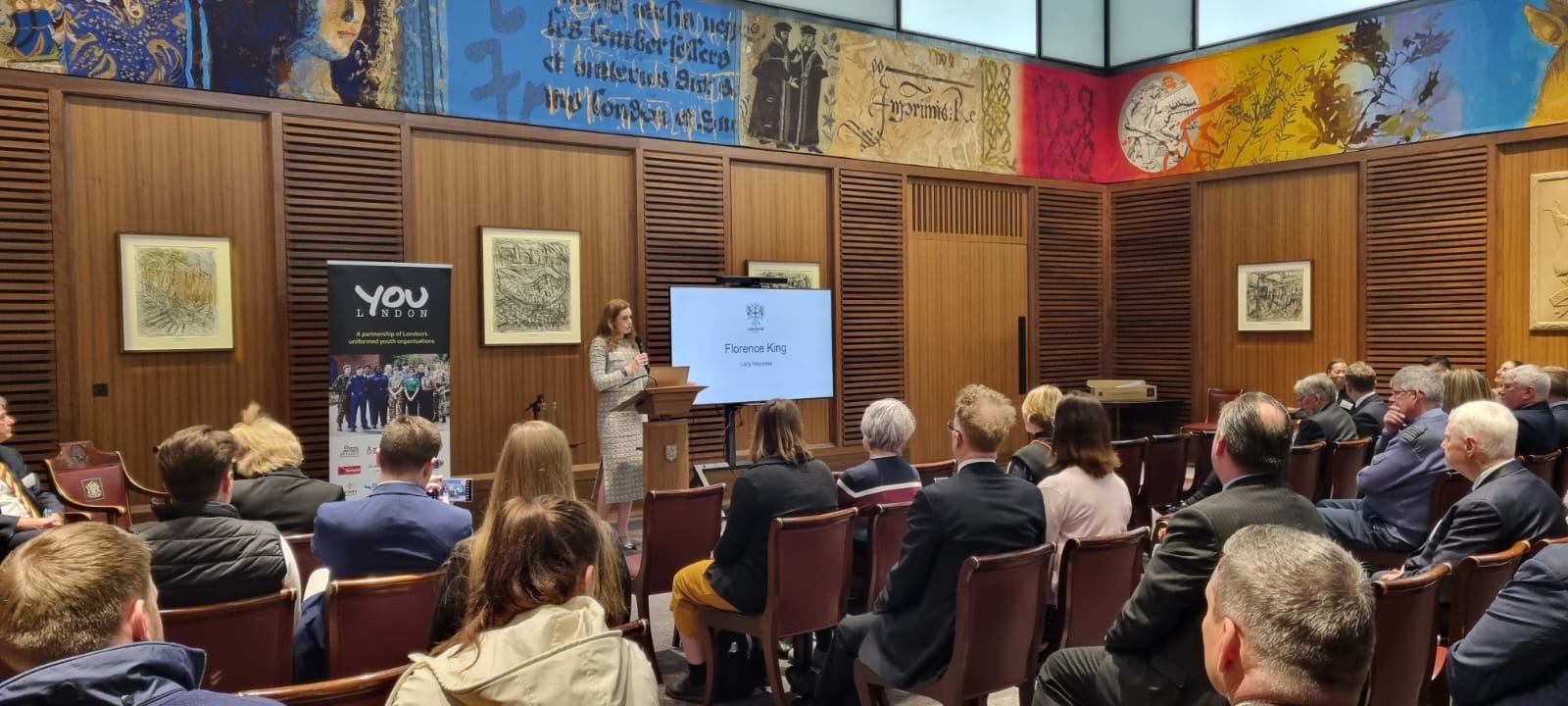News ARCHIVE

What are the benefits to companies of employee volunteering?
After an inspiring conference on employee volunteering in the City, delivered by YOU London and hosted by the Worshipful Company of Leathersellers, the Lady Mayoress of the City of London, Florence King, is calling for companies to encourage employees to volunteer with uniformed youth groups, and better support those already doing so. These groups, which provide mentorship, life skills and safe spaces for young people to grow and develop, all have waiting lists in London due to a shortage of adult volunteers.
Corporate-supported volunteering can have a meaningful impact on uniformed youth groups, particularly those dependent on committed individuals to provide safe, structured activities, challenge, training, discipline, education and enjoyment. By encouraging employees to give time and skills to these organisations, a business can directly contribute to shaping future leaders and strengthening social cohesion.
Speakers emphasised that freeing employees to volunteer not only strengthens local communities but also fosters a sense of purpose and engagement within the workplace. There is evidence that businesses which encourage volunteering gain from increased employee satisfaction, well-being and productivity, greater team collaboration and positive brand reputation. One in three job seekers say they would prefer to apply for roles that offer volunteer leave.
Dominic Pinkney, Programme Lead for the London Vision for Volunteering presented the findings of this 2025 report. He emphasised that the value of volunteering in London in 2023 was estimated to be £35.9 billion (Monetary Value of Trustees Report, 2023), and that volunteering in London is “not the icing on the cake, but the cake itself”.
Research from Benevity and Works4U shows that employee volunteering in London, which has recently risen above pre-pandemic levels, is reactive, ad-hoc and not reflective of community priorities. The London Vision for Volunteering taskforce found that:
- 100% of stakeholders engaged in the consultation recommended that employee volunteering should be promoted more.
- 95% recommended that employers should do more to promote volunteering opportunities to their employees.
- 4% of employees who had volunteered wished to do so again.
- 25% of employees do not know how much time their employer offers for volunteering.
The London Vision for Volunteering report calls for:
- An infrastructure to promote, support and develop employee volunteering.
- Government incentives or legislation to encourage employee volunteering.
- Best practice tools for employee volunteering; a better understanding of impact, and more research and analysis.
Gary Langley, who has extensive experience in the corporate sector and is Honorary Colonel, Middlesex and North West London Army Cadet Force, outlined the findings of The University of Northampton 2021 report, What is the social impact and return on investment resulting from expenditure on the Cadet Forces in the UK? Among the significant positive impacts on young people participating in the Cadet Forces, it found that performance at school, and employment and career prospects, were improved. This was particularly evident in young people suffering from economic deprivation and other disadvantages.
The report also found that volunteering with Cadet Forces greatly benefitted adult volunteers. This included access to vocational qualifications; leadership, planning, communication, teamwork and motivational skills; improved personal well-being; resilience and improved life-satisfaction – all of which are a direct benefit to their employers.
The University of Northampton research, led by Professor Simon Denny, indicated that the ROI the UK gained from expenditure on the Cadet Forces was vastly greater than the c. £180m annual cost. The above-mentioned benefits adults gained from volunteering were estimated to be worth over £400m p.a. All of this additional training, which directly improves a volunteer’s performance in the workplace, is free to their employers.
The Scouts, Girlguiding, Sea Cadets and St John Ambulance have joined together to campaign for a right to request up to 35 hours of paid volunteer leave each year, so that more adults have the opportunity to make a difference in their communities. The Scouts have a waiting list of c. 100,000 young people across the UK, wanting to join. To enable these young people to learn life-changing skills, they need around 40,000 more volunteers. Paid volunteer leave would allow more adults to lead Scout activities, volunteer during the workday, or leave work early to travel to a Scout group, without losing pay.
In addition to delivering face-to-face activities, volunteers are needed for administrative support to aid planning and act as trustees and treasurers; roles which can often be done in their own time or as part of a company employee volunteering scheme. There are a variety of opportunities for volunteers to be involved, dependent on their skill set and time available.
Clear messages from the conference included:
- Uniformed youth groups are adapting to provide team-based flexible volunteering, and that many people would volunteer just 1-2 hours a month if given the opportunity.
- There is a need to simplify the DBS system and provide clearer guidance for volunteers.
- Research is needed to better understand the value proposition to employers of employee volunteering, and a clear return on investment for employers needs to be quantified.
- More needs to be done to articulate the beneficial gain to young people, adult volunteers, society and businesses of employee volunteering and structured youth activities.
“Investing in young people through volunteering is not just a social duty – it’s an investment in a stronger future,” said Wing Commander Taz Bhachoo, Vice President of Global Sales at Kaiko Systems and Officer Commanding Middlesex Wing RAF Air Cadets, a volunteer role responsible for over 2,100 cadets. “Companies that support these efforts help create lasting change that benefits both employees and the wider community.”




 BACK TO NEWS
BACK TO NEWS





